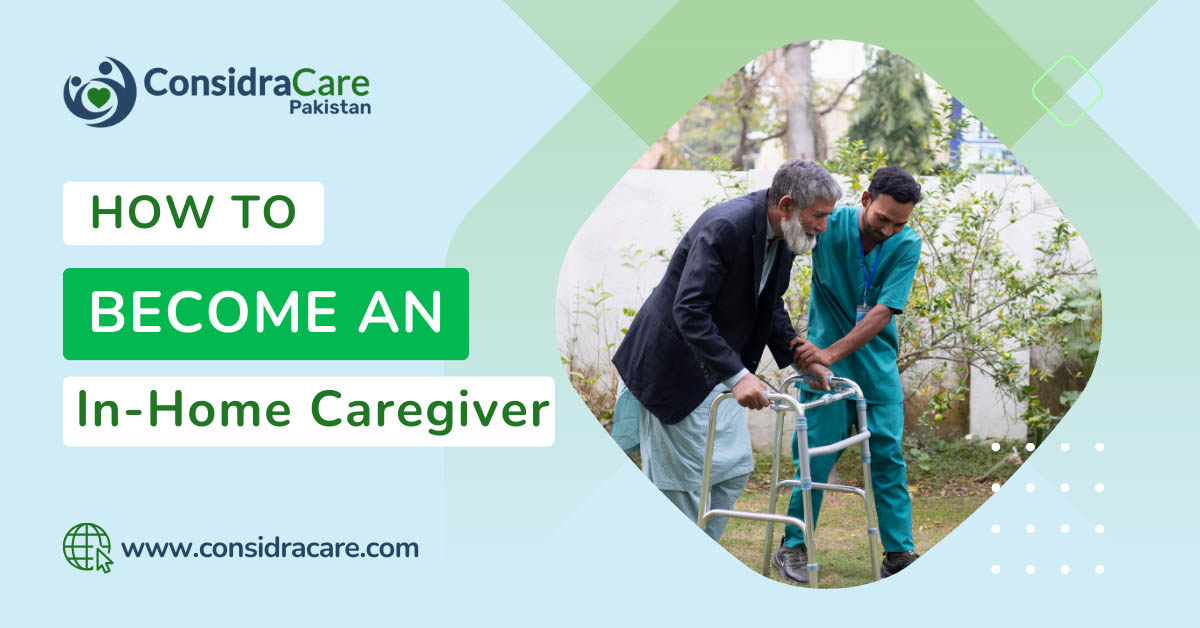Caregiving is immensely important in our society, as it plays a crucial role in supporting individuals who may be facing challenges due to illness, aging, or other circumstances. It’s a hard job where every day is different and can be tough. Caregivers and nurses need to be really kind and strong because they have to deal with a lot of feelings and complexities.
According to the Pakistan Economic Survey 2020-2021, “there are only 116,659 registered nurses available to serve a population of around 200 million”. This alarming disparity in healthcare resources is evident when considering the nurse-patient ratio in general wards, which currently stands at 1:40, significantly lower than the recommended ratio of 3:10 set by the Pakistan Nursing Council.
In order to fill this gap in healthcare services, in-home caregivers play a crucial role. If you’ve got a heart as big as your desire to make a difference, becoming an in-home caregiver might just be the calling you’ve been waiting for. As more people are getting older, the need for care at home is growing.
In this article, we’ll talk about how to become an in-home caregiver and how in-home caregivers can reduce the burden on hospitals in Pakistan.
What is the Role of an In-Home Caregiver?
Being an in-home caregiver involves providing a wide range of services to individuals who need assistance with their daily activities due to aging, illness, or disability. This essential role goes beyond just a job; it serves as a lifeline for those you care for. As an in-home caregiver, you play a crucial role in supporting and nurturing individuals, ensuring their well-being, and enabling them to live comfortably in the familiar surroundings of their own homes.
Your responsibilities may include helping with personal care, meal preparation, medication management, transportation, and companionship. By offering compassionate care and personalized support, you have the power to positively impact the lives of those you serve, providing them with the comfort and security they need to thrive.
Recognizing Key Personal Traits of Caregivers
Caregiving is a commitment to supporting and caring for others with compassion and effectiveness. To excel as an in-home caregiver, it is important to possess the following qualities:
- Patience: A successful caregiver remains calm and composed, even in challenging situations.
- Empathy: Being able to understand and share the feelings of those in their care is crucial for providing genuine support.
- Resilience: Caregivers must be able to bounce back from setbacks and continue to provide quality care.
- Strong Communication Skills: Effective communication is key to building trust, understanding needs, and fostering meaningful connections.
- Genuine Desire to Help Others: A heartfelt willingness to assist and make a positive impact on people’s lives is essential.
Relevant Training in Caregiving:
Formal training can help you improve your abilities and opportunities, even though it is not always mandatory. If you are living in Pakistan and interested in caregiving, first aid, CPR, and elder care, there are some training institutes that you can consider.
- Pakistan Red Crescent Society
- Allama Iqbal Open University
- Punjab Vocational Training Council
- The University of Lahore
Keep in mind that pursuing relevant training is a valuable step towards enhancing your caregiving abilities and expanding your professional prospects. The University of Lahore offers Personal Support Worker (PSW) training to caregivers associated with ConsidraCare Pakistan.
Building Experience as a Caregiver:
Hands-on experience can be invaluable for your future career as a healthcare professional. Consider volunteering at local hospitals or nursing homes in Pakistan. This will not only allow you to contribute to the community but also provide you with practical experience that you can apply in your future caregiving role. It’s an excellent way to learn and grow in your chosen field.
Are you ready to make a difference in someone’s life? Join ConsidraCare Pakistan, your trusted partner in providing compassionate in-home caregiving services. Apply now!
Seeking Certification and Licensing:
Acquiring certifications and licenses is essential for in-home caregivers in Pakistan to enhance their career prospects. The Certified Nursing Assistant (CNA) certification is recognized and opens up various career opportunities. Basic Life Support (BLS) and Advanced Cardiac Life Support (ACLS) certifications can also enhance your career prospects. Research the certification and licensing requirements in your field to position yourself as a well-qualified candidate.
Tips for Success as an In-Home Caregiver:
Success in in-home caregiving extends beyond technical proficiency. It hinges on the profound connections you cultivate with your clients. To excel in this rewarding field, consider the following aspects:
Embracing Empathy, Patience, and Compassion:
Caregiving is grounded in empathy, patience, and compassion. These qualities are essential for building trusting relationships with your clients, ensuring that your care is not only proficient but also deeply personal.
Managing Stress and Prioritizing Self-Care:
Caregiving can be emotionally and physically demanding. It’s vital to prioritize your own well-being. Practice stress management techniques like mindfulness or exercise, and don’t hesitate to seek support when needed. Remember, caring for yourself is the first step in caring for others.
Conclusion:
This guide helps those who want to be in-home caregivers in Pakistan. It’s a job with challenges but also a lot of satisfaction. If you want to really help seniors and those who need care, being an in-home caregiver is a great choice.
FAQ’s:
1. How do I become a successful caregiver?
To become a successful caregiver, you should gain relevant training and certifications. Develop empathy and communication skills. Also, stay informed about the care recipient’s needs and prioritize self-care to prevent burnout.
2. What are the job duties of a caregiver?
- Assisting with daily activities (bathing, dressing, etc.).
- Administering medications.
- Monitoring health conditions.
- Providing emotional support and companionship.
3. What qualities make you a good caregiver?
- Compassion and empathy.
- Patience and adaptability.
- Effective communication.
- Trustworthiness and reliability.
4. What are the three most important qualities of a caregiver?
- Compassion: Demonstrating genuine care for others.
- Patience: Handling challenges calmly and positively.
- Reliability: Consistently fulfilling responsibilities.
5. What is the hardest work in caregiving?
- Balancing emotional involvement with professional detachment.
- Managing stress and maintaining one’s own well-being.
- Handling difficult situations, such as end-of-life care or complex medical conditions.



